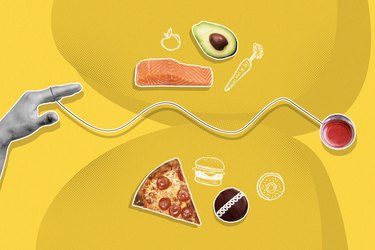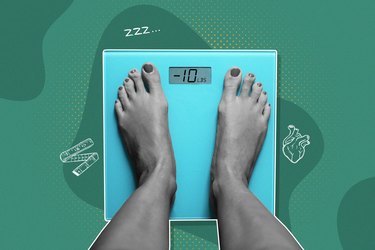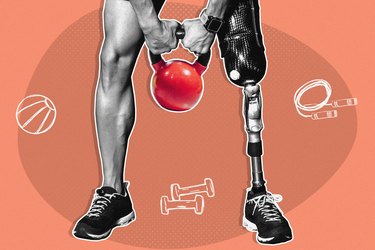
If you've ever tried to lose weight, you know there are dozens of diets out there that promise fast, dramatic results. But jumping on an overly restrictive diet usually causes people to lose weight fast, only to regain it when normal eating resumes.
When you switch to a different diet only to start the pattern over again, it's called "yo-yo dieting" or "weight cycling."
Video of the Day
Video of the Day
"I've seen a lot of yo-yo dieting with my clients," says Bonnie Taub-Dix, RDN, a New York City-based nutrition consultant and author of Read It Before You Eat It. "But when you lose a lot of weight and gain it back, that to me is not a successful diet. If the food you're eating is not something you can live with daily, it's probably not going to work long-term."
In addition to being ineffective, yo-yo diets can cause psychological and physical damage — some of it permanent. Here, the surprising ways weight cycling affects your body.
1. Your Muscle Mass May Decrease
Because yo-yo dieters tend to lose weight quickly, they typically shed muscle along with fat, says Taub-Dix, even when exercise is thrown into the mix. But on the upswing, when dieters resume normal eating and start gaining their weight back, they're only gaining back fat.
Why that's bad news? This means the next time you try to lose weight, it will likely be much more difficult, because your body now has less fat-burning muscle and your metabolism (or basal metabolic rate) slows down.
Not surprisingly, a June 2019 study in Obesity found that people who yo-yo diet tend to have less muscle mass and strength than those who don't.
2. Your Digestive System Takes a Hit
"What I typically see in a yo-yo diet is that, on the upswing, people are overeating," says Taub-Dix, referring to periods between calorie restriction. "This causes digestive issues like reflux, stomachaches and even intermittent constipation or diarrhea depending on what you're eating and how much."
According to an August 2013 study in the Journal of Psychosomatic Research, periods of binge-eating are also heavily associated with conditions like gastroesophageal reflux disease (GERD) and irritable bowel syndrome (IBS). Both of which researchers say can lead to more periods of food restriction in order to alleviate painful symptoms or flare-ups — which continue the harmful cycle of restricting and binging and can result in even more tummy troubles in the future.
"Going on a diet can make you grumpy, stressed, anxious and depressed, and it's not just from the social effect of feeling like you can't go out for dinner or eat something you want — it's because dieting affects the mood communication system that we have between our gut and our brain."
3. Your Gut Health Declines

"Weight cycling can contribute to chronic inflammation over time, and that's where we see brain and gut health being affected," says Tammy Beasley, RDN, a dietitian based in Huntsville, Alabama, who serves as vice president of clinical nutrition services for the Alsana eating recovery centers.
Researchers have known for years that the gut microbiome plays an important role in producing serotonin, a neurotransmitter responsible for regulating appetite, mood, behavior and sleep. But any kind of dietary restriction, says Beasley, can throw the gut microbiome dangerously out of whack, disrupting our serotonin as well as the production of other important hormones.
"Fad diets tend to eliminate one or more entire food groups, and that's pretty serious," Beasley says. "Your gut needs a variety of food sources, and when it loses that variety the good bacteria doesn't have the food it needs to sustain itself, and it starts to die off."
When the gut microbiome is depleted, Beasley adds, your mood can suffer.
"Going on a diet can make you grumpy, stressed, anxious and depressed, and it's not just from the social effect of feeling like you can't go out for dinner or eat something you want — it's because dieting affects the mood communication system that we have between our gut and our brain."
Related Reading
4. Your Heart Feels the Stress
Weight cycling can also wreak havoc on your heart, says research from Obesity Reviews published in February 2015.
When one loses weight, the study explains, it affects a number of body functions, including heart rate, blood pressure, blood sugar and lipid levels. But cycling through periods of weight loss and gain can cause all of these things to fluctuate dramatically, which puts stress on the cardiovascular system as a whole.
Not surprisingly, then, research presented at the American Heart Association's Epidemiology and Prevention | Lifestyle and Cardiometabolic Health Scientific Sessions in March 2019 showed that women who lost at least 10 pounds and regained the weight again within one year had more risk factors for cardiac disease, including higher BMI, high cholesterol, increased blood sugar and high blood pressure.
5. Your Self-Esteem Takes a Dip
The psychological effects of weight cycling can be particularly damaging — and the most often overlooked, Beasley says.
"Weight cycling is often associated with feelings of failure," Beasley explains.
The vast majority of people do not sustain long-term weight loss from frequent yo-yo dieting, and when the weight comes back, self-esteem can take a dive. This, she says, leads to a "cascading effect" of negativity, which does actually have effects on one's overall health.
"When someone feels like a failure, I find they go in for preventative checkups less often, usually because of the fear of weighing in. They end up avoiding taking care of their health in a preventative way, which can increase their overall health risk if they're not getting care."
What to Do Instead of Yo-Yo Dieting
The solution? Instead of bouncing from one quick-fix diet to the next, adopt healthier habits you can stick with, to help you lose weight and keep it off. (Think: Committing to exercising several days each week, cooking more at home, choosing more whole foods than processed or fast foods, etc).
It's also a great idea to speak with a professional, such as a registered dietitian and/or personal trainer, to create a healthy, sustainable eating and exercise plan that will work for you.
- Obesity: "Weight Cycling as a Risk Factor for Low Muscle Mass and Strength in a Population of Males and Females with Obesity"
- Journal of Psychosomatic Research: "Binge Eating, Body Mass Index, and Gastrointestinal Symptoms"
- Obesity Reviews: "Dieting and weight cycling as risk factors for cardiometabolic diseases: who is really at risk?"
- American Heart Association: "Yo-yo dieting may increase women’s heart disease risk"



